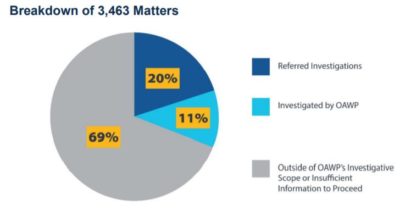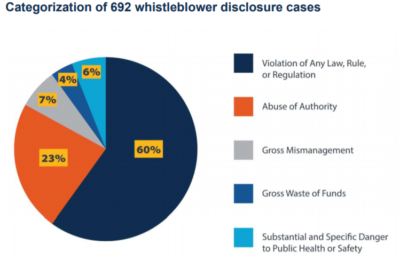 WASHINGTON — The Office of Accountability and Whistleblower Protection, created three years ago to provide protections for VA employees and investigate allegations of misconduct against senior department officials, has followed through with only a small fraction of the cases it has investigated.
WASHINGTON — The Office of Accountability and Whistleblower Protection, created three years ago to provide protections for VA employees and investigate allegations of misconduct against senior department officials, has followed through with only a small fraction of the cases it has investigated.
According to a report provided by OAWP to Congress, between October 2018 and May 2020, the office, established by President Donald Trump in 2017, recommended disciplinary action against only seven senior VA employees, representing about 2% of the cases it investigated. This comes after forwarding the vast majority of cases that came across the office’s desk back to VA facilities or other VA offices to handle.
During those 19 months, the OAWP received 3,463 reports of abuse from VA employees. Of those, 2,382 were deemed to have insufficient information to proceed or were outside the office’s investigative scope and were sent to other VA offices for follow-up. Another 692 were categorized as whistleblower disclosures rather than reports of whistleblower abuse and were also forwarded to other VA offices.
Only 389 cases received were categorized as allegations of whistleblower retaliation or senior leadership misconduct and determined to be in OAWP’s wheelhouse. It was from this pool that the office recommended discipline for seven senior VA employees. Of those seven, only one was for retaliation against a whistleblower by a supervisor, while the other six were for poor performance or misconduct.
 A VAMC chief of staff was recommended for demotion because of failure to separate an employee from a sexual harasser. Another VAMC chief of staff was recommended for suspension after closing a surgery program without ensuring that a community referral policy was in place, potentially endangering veterans in that hospital’s care.
A VAMC chief of staff was recommended for demotion because of failure to separate an employee from a sexual harasser. Another VAMC chief of staff was recommended for suspension after closing a surgery program without ensuring that a community referral policy was in place, potentially endangering veterans in that hospital’s care.
The report provides little detail about the one whistleblower retaliation case where OAWP recommended action. According to the report “a VAMC supervisory physician engaged in whistleblower retaliation after proposing the removal of an employee.” While OAWP “recommended corrective action” against the supervisor, VA was unable to follow through, as that person was no longer a VA employee. The VAMC followed through with corrective action in the whistleblower’s favor, however.
According to OAWP, nearly 40,000 VA supervisors fall under the office’s investigative scope for whistleblower retaliation and 1,000 senior VA leaders for misconduct and poor performance.
Investigative Procedures
Much of the OAWP’s report to Congress deals with improving its investigative procedures. Those issues also were spotlighted in a VA Office of the Inspector General (OIG) report released in fall 2019.
The report determined that in the first year of OAWP’s existence, systemic problems within the office deeply undercut its mission. OAWP was found to have taken on cases that didn’t fall under its purview, for example investigating matters that could be categorized as criminal felonies which should have been passed on to the OIG.
The office was also found to have passed on cases it should have taken, sending them back to VA facilities that were ill-equipped to investigate and sometimes releasing the identities of whistleblowers in the process. This resulted in further reports of retaliation against whistleblowers and a deterioration of VA employees’ faith in the ability of the office to protect them.
According to the report, OAWP is establishing internal controls that will “mitigate risks of violating agency law, rule, or regulation.”
The report also lauds the office’s ongoing elimination of backlogged cases. In late 2019, OAWP had 572 cases pending for over 120 days, some going back as far as 2017. OAWP has since reduced its backlog by over 60%. However, much of that reduction has come through determining that the cases do not fall under OAWP’s investigative scope.
The report gives the example of several cases that involve allegations of discrimination.
“In those cases, we informed the complainants that we are closing their cases with OAWP, but they could file an Equal Employment Office (EEO) complaint with the Office of Resolution Management (ORM), which has jurisdiction over the allegations,” the report states.
While the OAWP report presents this as a positive for the office, it seems to perpetuate the same patterns that legislators and VA employees have complained about in the past. In previous Congressional hearings, VA employees described the whistleblower process at VA as mismanaged and labyrinthine. They testified that their complaints would sit for months or years at a particular office only to be later told that they needed to file their complaint elsewhere.
The report does not note how long these particular discrimination complaints were with OAWP or how much, if any, assistance employees were given in how to refile their complaint with EEO.

